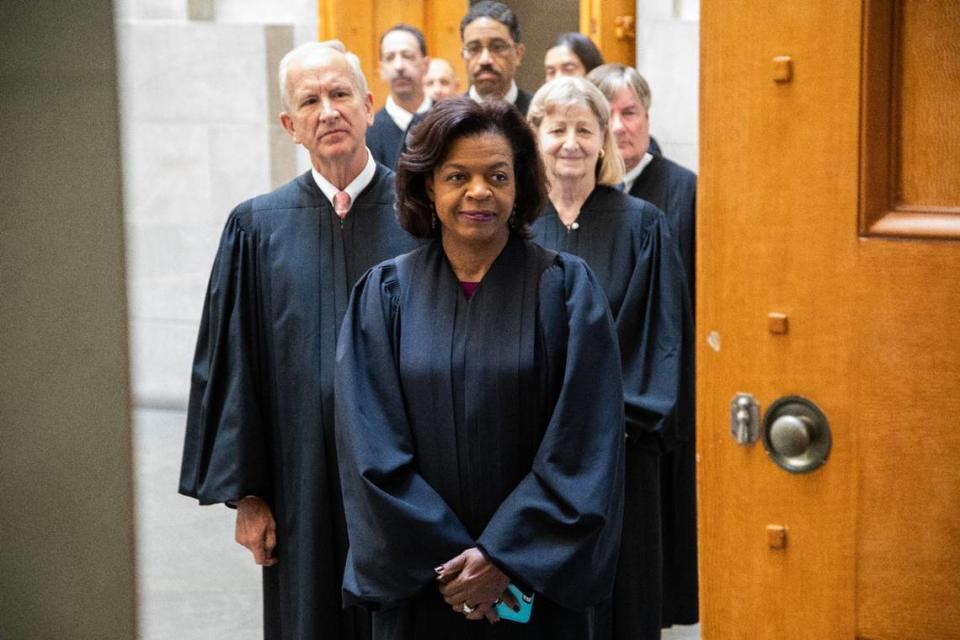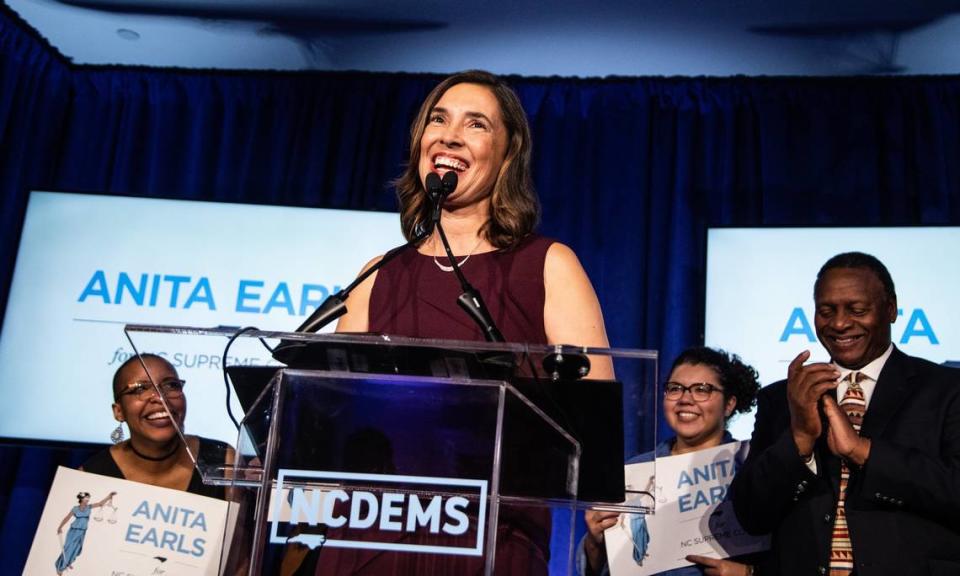Who might Biden nominate to succeed Breyer on Supreme Court? In NC, two names emerge
- Oops!Something went wrong.Please try again later.
- Oops!Something went wrong.Please try again later.
- Oops!Something went wrong.Please try again later.
- Oops!Something went wrong.Please try again later.
Could a North Carolina judicial official be next in line for a spot on the U.S. Supreme Court bench?
Some say it’s possible.
Others say President Joe Biden is looking elsewhere in the country.
On Thursday, Supreme Court Justice Stephen Breyer, the senior member of the court’s liberal wing, formally announced he would step down this year. Word of his retirement Wednesday led to immediate speculation on who might replace him.
In North Carolina two names came to mind: state Supreme Court Justice Anita Earls and former Chief Justice Cheri Beasley.
Campaign promise
Focus has been on the country’s top Black jurists because of a campaign promise Biden made to appoint the first Black female justice to the Supreme Court if given the opportunity.
On Wednesday afternoon the White House reaffirmed that commitment.
“As a Black woman, I can tell you representation matters,” said Aimy Steele, the executive director of The New North Carolina Project.
Steele’s organization works to increase voter participation “of Black and Brown communities.” She’s also an educator and has twice run for state House.
“When we see a person who looks like us in a position of power or in an executive leadership position, it undoubtedly allows us to create a sense of hope or to have a sense of hope that its possible for us if that’s what we aspire to one day,” Steele said. “It provides just a comfort in knowing that someone else in the race, being Black, is making advancement in an area that has traditionally been occupied by non-people of color.”
Both Earls and Beasley fit that bill.
Demand Justice, a progressive group focused on the federal courts, keeps a running short-list of potential Supreme Court nominations and includes both women on its list.
Earls declined to comment on whether she would be interested.
Beasley thanked Breyer for his service.
“A vacancy on the Supreme Court presents an opportunity for President Biden to make good on his promise and nominate one of many talented, qualified African American women jurists,” Beasley said in a written statement. “As the former Chief Justice of North Carolina’s Supreme Court, I firmly believe that our Supreme Court — like all institutions — must reflect the diversity of our nation.”
Cheri Beasley

Two years ago, a nomination of Beasley would have made sense politically.
The 55-year-old Democrat has spent her career in the North Carolina judicial system. She began as a public defender, became a judge, then a Court of Appeals judge, a Supreme Court justice and finally in 2019, Gov. Roy Cooper appointed her as North Carolina’s first Black female chief justice.
Her election to the Court of Appeals also made her North Carolina’s first Black woman elected to a statewide office without first having been appointed by the governor.
In her tenure as chief justice, Beasley navigated the court system through a pandemic and nationwide demands for racial equality in the judicial system.
She lost her seat in 2020 to Chief Justice Paul Newby, a Republican, who won by just 401 votes.
Beasley turned her focus to a run for U.S. Senate and managed to turn her main opponents, state Sen. Jeff Jackson and former state Sen. Erica Smith, into supporters. Both of them walked away from their campaigns and Beasley became the likely nominee.
Jackson is pausing his political career and Smith is making a run for the House of Representatives in the 2nd Congressional District.
Chris Cooper, political science professor at Western Carolina University, said that taking Beasley out of the U.S. Senate race wouldn’t make sense.
“North Carolina is on the shortest of short lists of competitive Senate races,” Cooper said. “The Democratic Party has clearly gone all in on Cheri Beasley and to take her out now would move a toss-up race squarely into Republican hands.”
Steele said it would be an honor for North Carolina to have Beasley on the Supreme Court, but the state needs her in the U.S. Senate.
Beasley’s spokeswoman, Dory MacMillan, confirmed to The News & Observer that Breyer’s retirement doesn’t change Beasley’s plan.
“Cheri is fully committed to running for the U.S. Senate to fight for North Carolina to lower costs, grow good-paying jobs, strengthen our schools, and ensure our seniors can retire with dignity,” MacMillan said.
Anita Earls

That leaves Earls, who is a trailblazer in her own right.
Earls grew up in a segregated neighborhood of Washington state in the 1960s. Her parents moved there so they could be legally married since her father was Black, her mother was white and interracial marriages weren’t yet legal across the United States.
As an adult, Earls obtained degrees from Williams College and Yale University and in 1988, she was recruited to join North Carolina’s first integrated law firm to practice civil rights litigation. During the Clinton administration, she joined the U.S. Department of Justice’s Civil Rights Division where she worked as a deputy assistant attorney general.
In the past decade, Earls became the public face for North Carolina’s voting rights cases as she worked with the Southern Coalition for Social Justice taking on maps that were found in court to have been racially gerrymandered and voter ID laws.
She stepped down from that position to run for N.C. Supreme Court in 2018.
On Twitter, CNN’s Jake Tapper was one of the first to throw Earls’ name out publicly for Breyer’s job but immediately noted that her age, of 61, may disqualify her from the lifetime appointment. Presidents hope to nominate candidates in their mid-40s to early-50s in hopes of selecting someone for a longer tenure.
The most recent Supreme Court nominee, Amy Coney Barrett, is the youngest justice at 49. Breyer is the oldest at 83. Four of the justices are younger than Earls.
“For a member of Congress, for a senator, to run for president, she’s not that old,” Cooper said. “But for a lifetime appointment, you know, there’s no way Biden’s going to select anybody with that many years behind them.”
Eyes on Biden
As potential shortlists of possible nominees circulated Wednesday two women were consistently listed: federal appellate Judge Ketanji Brown Jackson and California Supreme Court Justice Leondra Kruger.
Kruger is 45 years old and Jackson is 51.
N.C. Democratic Party Chair Bobbie Richardson credited Biden for appointing more Black women to the U.S. Court of Appeals than any other president.
“The North Carolina Democratic Party celebrates the Biden-Harris administration’s leadership in transforming our judiciary to reflect the strength and diversity of our nation, and we welcome the opportunity for continued history to be made,” Richardson said.
When asked what would happen if Biden backs away from his campaign promise, Steele said that there has been frustration from voters about some of the other promises the administration made. She said people don’t understand why pieces of legislation like the the George Floyd Justice in Policing Act and the John Lewis Voting Rights Act haven’t passed.
Steele said if Biden does back off of his promise it would further sow distrust in government.
“People are getting tired of hearing promises that aren’t kept,” Steele said. “We’re slowly creeping into the season of needing to really motivate people and talk about this general hope and inspiration because people are tired.”
For more North Carolina government and politics news, listen to the Under the Dome politics podcast from The News & Observer and the NC Insider. You can find it at link.chtbl.com/underthedomenc or wherever you get your podcasts.
Under the Dome
On The News & Observer's Under the Dome podcast, we’re unpacking legislation and issues that matter, keeping you updated on what’s happening in North Carolina politics on Monday mornings. Check us out here and sign up for our weekly Under the Dome newsletter for more political news.

